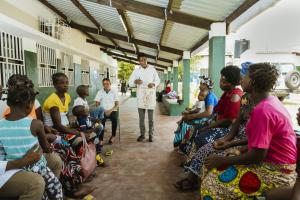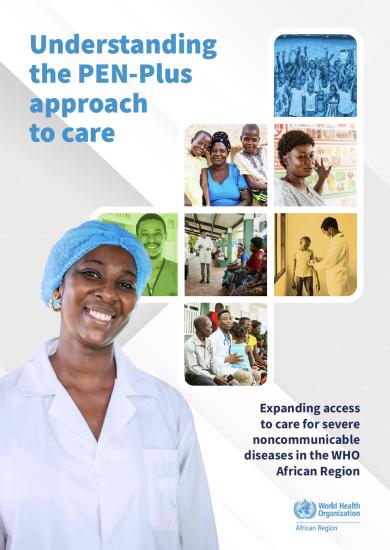New WHO report highlights progress in the fight against severe chronic diseases
Brazzaville – Twenty African countries have increased access to services for severe chronic disease such as type 1 diabetes, sickle-cell disease, and rheumatic and congenital heart diseases, over the last four years since adapting a new model to decentralize the critical services, a new report by World Health Organization (WHO) shows.
The report released today by WHO Africa with support from the Leona M. and Harry B. Helmsley Charitable Trust provides insights on the burden of severe chronic diseases in Africa, highlighting the significant progress of the PEN-Plus model in addressing these diseases across the twenty implementing countries.
The report “Understanding the PEN-Plus approach to care” finds that over 15 000 people are receiving treatment for severe NCDs across implementing countries, with training provided to local experts. In Malawi for example, the PEN-Plus model national scale-up is well under way, with over 440 clinicians and nurses trained and six secondary-level health facilities providing PEN-Plus care to over 300 patients living with severe NCDs.
In addition to training local experts on severe NCD care, the report reveals that, the services provided through PEN-Plus are free of charge – helping to reduce the significant financial burden on families caring for children living with severe chronic diseases.
The PEN-Plus strategy expands upon the WHO PEN (Package of Essential Noncommunicable disease interventions), which decentralizes care for common NCDs to primary healthcare facilities. PEN-Plus extends this care to first-level referral facilities, such as district hospitals, and has demonstrated significant success in increasing patient access to treatment for severe NCDs, improving patient outcomes.
In the African region, severe non communicable diseases, including type 1 diabetes, sickle-cell disease, and rheumatic and congenital heart disease, disproportionately affect children, adolescents, and young adults living in some of the poorest areas, claiming over half a million lives yearly, with approximately 100 000 of those deaths attributed to just these four conditions.
“PEN-Plus is a groundbreaking approach to providing easily accessible, person-centred care to some of the most vulnerable in our communities,” said Dr Chikwe Ihekweazu, Acting WHO Regional Director for Africa. “With the support of the WHO Regional Office for Africa, The Leona M. and Harry B. Helmsley Charitable Trust and other partners, the African Region is leading the way in response to these diseases in resource-poor areas, rolling out technical support to Member States to move towards implementation of the programme.”
The report highlights the PEN-Plus model, originally developed in Rwanda, as a crucial strategy to bridge the gap in access to specialized NCD care. The PEN-Plus model expands upon the WHO PEN (Package of Essential Noncommunicable disease interventions), which decentralizes care for common NCDs to primary healthcare facilities. PEN-Plus extends this care to first-level referral facilities, such as district hospitals, and has demonstrated significant success in increasing patient access to treatment for severe NCDs, improving patient outcomes.
The report serves as a vital resource for policymakers, health experts, partners, donors, and communities, aiming to ensure that NCDs remain prioritized on the global agenda. It emphasizes the urgent need for continued investment and collaboration to expand PEN-Plus coverage across the region, create sustainable health systems for all, leading to better health outcomes for underserved populations.
“By working together and pledging the necessary resources, countries can drive collective action to improve health and quality of life for millions of people around the world,” said James Reid, Program Officer at the Helmsley Charitable Trust.




